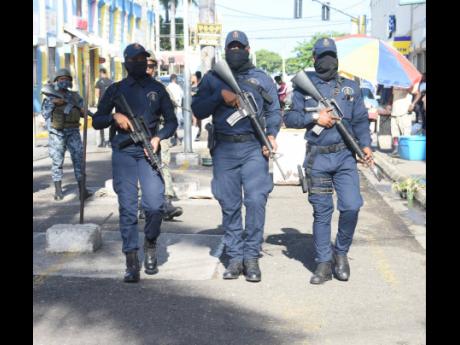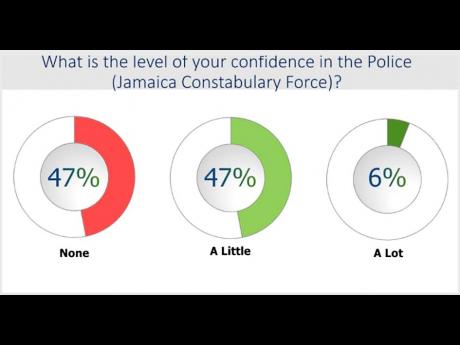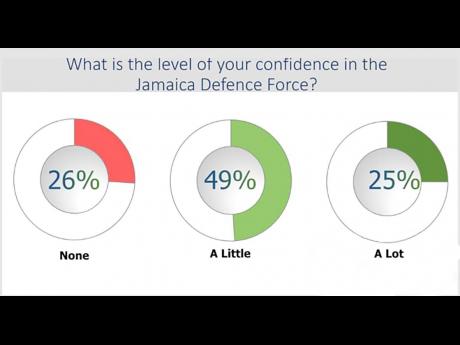Vote against cops, army
Fear of soldiers being contaminated
Abysmally low public confidence in soldiers and the police presents a grave threat to law and order in Jamaica, experts say, with overexposure of the army cited for the increased risk of being “somewhat contaminated”. The analysis is drawn from a...
Abysmally low public confidence in soldiers and the police presents a grave threat to law and order in Jamaica, experts say, with overexposure of the army cited for the increased risk of being “somewhat contaminated”.
The analysis is drawn from a July RJRGLEANER-commissioned poll showing 94 per cent of Jamaicans having a little, or no, confidence in the police and 75 per cent with similar sentiments for the army.
In a Gleaner interview on Monday, former National Security Minister Derrick Smith said the findings indicated that “we have two groupings interfacing with the population and the majority of the population seem not to have much confidence in any of them.
“It is an unfortunate and very worrying trend for any government heading into the future,” the 78-year-old retired veteran lawmaker said.
While arguing that the army was a crucial partner in the war against violent crime, Smith observed that the increased deployment of soldiers in states of emergency (SOEs) and zones of special operations (ZOSOs) had caused some members of the Jamaica Defence Force (JDF) to be “on the streets too long and have got somewhat contaminated”.
“Because over time they have been out there for so long and getting themselves into squabbles in various communities ... that's the reason why this perception is developing out there which is unfortunate and dangerous,” Smith said.
The poll, conducted between July 16 and 26 among 1,113 people aged 18 and older, showed that the JDF was enjoying greater confidence among the population, with 25 per cent having a lot of faith in them compared with six per cent who have a lot of confidence in the Jamaica Constabulary Force (JCF).
A review of various demographic groups showed that while confidence in the police was low across the board, it was most emphatic among persons aged 25-34, pollster Don Anderson said.
But Smith observed that the trust in the army was waning.
The grim review coincides with a meteoric increase in complaints against the JCF and the JDF in the last three and a half years.
Data obtained from the Independent Commission of Investigations (INDECOM), the watchdog tasked with probing the security forces, show that the public lodged 625 complaints against the police and 15 against the JDF in 2019.
The following year – when SOEs were imposed in around half of the 19 police divisions – complaints against cops increased to 926 while grouses against the army tripled to 46.
In 2021, INDECOM recorded 916 complaints against the JCF, while 29 were made against the JDF.
For the period January to March 2022, INDECOM received 212 complaints against the police and nine against the army. Second-quarter data were not available.
The University of the West Indies' leading expert on national security and economic development, Professor Anthony Clayton, said that while important reforms are taking place in the police force, only credible results will rekindle trust.
Clayton agreed with Smith that confidence in the JDF has been whittling away in recent years because of the widespread use of SOEs and ZOSOs.
But the UWI professor has argued that the serious lack of confidence in the police was owing to the fact that the country had not yet overcome the legacy of the past – that of the distrust of the police.
Clayton said the police have been haunted, in the past, by accusations of brutality, extrajudicial killings, corruption, and inappropriate relations with politicians.
“And so you will arrest somebody or not arrest them according to what the local MP said. You would not arrest one of their friends but you might have a clear hand to arrest somebody who might be one of their political opponents,” Clayton said.
He said that such actions were incompatible with modern policing which should be apolitical and based solely on evidence and justice.
Clayton said, however, that it was not fair for the police to take flak for legacy issues, noting that the force has been undergoing significant transformation.
“I do believe that the JCF is embarked on a journey of very substantial reform but people will not believe this until they actually see the change in police behaviour on the ground,” Clayton said.
Smith, too, believes that Jamaicans could do more to assist the security forces rather than criticising their failures. He said that civilians had a role in curbing crime in their communities.
Clayton insists that Jamaicans have a major role to play in solving crime, noting that residents often call for justice but defend wrongdoers at the point of arrest.
“People have to understand that we cannot blame the police for everything that is wrong in society,” he told The Gleaner.
“It is fair game to criticise the police, but I think we also have to accept that the police are quite often put in an impossible position, and if people want law and order and justice, they must also be prepared to give up the criminals that they know about.”
Commenting on the findings of the poll, Anderson believes that “confidence in the army has fallen since the citizenry has become accustomed to seeing them on the streets along with the police”.
“Persons in the lower income segment were also more vocal than the other income groups in this regard, expressing the lowest levels of confidence,” Anderson said in an interview on Monday.



